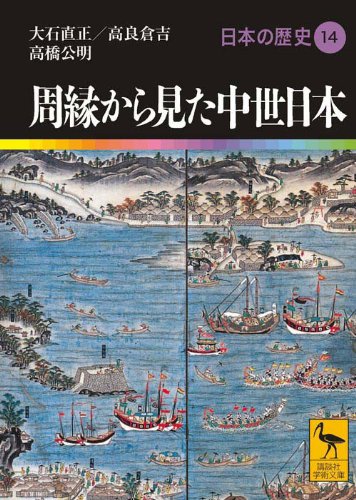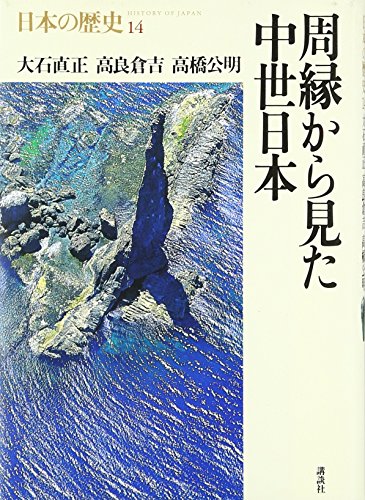32 0 0 0 OA 日本における済州島史についての研究動向(16世紀以前)
- 著者
- 高橋 公明
- 雑誌
- グローバリゼーションの歴史的前提に関する学際的研究
- 巻号頁・発行日
- pp.231-234, 2003-08
科学研究費補助金 研究種目:基盤研究(A) 課題番号:12309009 研究代表者:荒野泰典 研究期間:2000-2002年度
1 0 0 0 周縁から見た中世日本
- 著者
- 大石直正 高良倉吉 高橋公明 [著]
- 出版者
- 講談社
- 巻号頁・発行日
- 2009
1 0 0 0 IR 外交称号、日本国源某
- 著者
- 高橋 公明 Takahashi Kimiaki
- 出版者
- 名古屋大学文学部
- 雑誌
- 名古屋大学文学部研究論集 (ISSN:04694716)
- 巻号頁・発行日
- no.113, pp.p239-251, 1992
1 0 0 0 IR 中世東アジア海域における海民と交流--済州島を中心として
- 著者
- 高橋 公明 Takahashi Kimiaki
- 出版者
- 名古屋大学文学部
- 雑誌
- 名古屋大学文学部研究論集 (ISSN:04694716)
- 巻号頁・発行日
- no.98, pp.p175-194, 1987
1 0 0 0 周縁から見た中世日本
- 著者
- 大石直正 高良倉吉 高橋公明著
- 出版者
- 講談社
- 巻号頁・発行日
- 2001
- 著者
- 高橋 公明 TAKAHASHI Kimiaki
- 巻号頁・発行日
- 2005-08-31
11th Conference of the European Association for Japanese Studies
1 0 0 0 外交儀礼よりみた室町時代の日朝関係
- 著者
- 高橋 公明
- 出版者
- 公益財団法人史学会
- 雑誌
- 史學雜誌 (ISSN:00182478)
- 巻号頁・発行日
- vol.91, no.8, pp.1303-1323, 1370-1372, 1982-08-20
The purpose of the present paper is to investigate the political relations between Korea and diplomats from the western region of Japan from 1390 to 1470, when Japanese-Korean international relations were most extensively developed. By this analysis two points can be clarified as follows. 1)The diplomatic relations between two countries during the time in question possessed both sufficient substance and formality, which can be difined as the "Korean diplomatic order." 2)While diplomats from western Japan regarded Korea as a great world power, the Koreans did regard Japan as a country of less importance. The process of proving these two points can be described as follows. First, the famous Chronicles of Countries to the East of the sea (海東諸国紀), a document describing working relations between diplomats of two countries, is a work which expresses an ideal of alienage of Japan from the viewpoint of Korea and extracts the actual foundation of this ideal from diplomatic relations. The characteristics of diplomatic relations during this period can be expressed as the ceremonial position of Japanese diplomats as seen by the Korean side and mediated through an order of status within the Korean bureaucratic system. We can explain further as following : 1)messengers dispatched to Korea by Japanese diplomats were treated according to the Korean bureaucratic code in Korean Court decorum ; and 2)Japanese diplomats themselves were also given status ranked by Korean bureaucrats who could directly send and receive diplomatic documents. We may conclude that ceremonial position of Japanese Imperial Messengers was relatively low and that, since all diplomats to Korea formed relations on personal basis, they could be on an equality with Korean side. Rather, they found themselves in various kinds of subordinate relations to the Korean Court. All diplomats from outside had to observe the Korean state order in termes of obligation. Instead diplomats were given guarantees from Korea concerning their economic interests and activities. As a result of the widespread formation of such subordinate relations, there may have developed the idea of Korea as a great world power of the times. Certainly such an idea have been arisen among those who depended upon East Asian sea commerce. And when favorable conditions came about in Korea between 1466 and 1471, many diplomatic messengers were sent to Korea basing on such an idea. The above research indicates that the "Korean-centrism" expressed in the Chronicles of Countries to the East of the sea was supported by the actual diplomatic contacts. It is in this sense that the present paper is able to criticize, in part, the conventional view of an East Asian world which over-emphasizes international relations centered around China and underestimates the political importance of relations between other countries within this sphere. It may be expected that this paper expresses the necessity of survey from many points of view in terms of foreign contacts in the medieval East Asia.
1 0 0 0 OA 済州島出身の官僚高得宗について
- 著者
- 高橋 公明 Takahashi Kimiaki
- 出版者
- 名古屋大学文学部
- 雑誌
- 名古屋大学文学部研究論集史学 (ISSN:04694716)
- 巻号頁・発行日
- vol.36, pp.1-21, 1990-03-31
1 0 0 0 OA 外交称号、日本国源某
- 著者
- 高橋 公明 Takahashi Kimiaki
- 出版者
- 名古屋大学文学部
- 雑誌
- 名古屋大学文学部研究論集史学 (ISSN:04694716)
- 巻号頁・発行日
- vol.38, pp.239-251, 1992-03-31 (Released:2008-04-30)
大陸沿岸・半島部・島嶼部で構成される東アジアでは、海を舞台とした人間の営みが大きな意味を持つ。本研究では、東アジアの国際関係史、文化交流史および海事史などで扱われている諸課題を相互に連関させ、かつそれらを基礎づけるとものとして「海域史」を位置づける。その立場から既知・未知を問わずに資史料を発掘し、新たな方法論を提示して、これまで見えてこなかった局面に光をあてた。こうした「海域史」の立場から資史料を見たとき、常に大きな困難となるのは資史料の性格である。第1に、中心(国家)から周縁(地域)を見る立場から作成された資史料が多いこと、第2に、「嘘」や「誇張」が含まれた記述を解釈しなければならないこと、第3に、文学作品や舞台表現など、そもそも「事実」であることを保証していないものも、資史料として活用しなければならないことなどである。以上の認識に基づいて、(1)古地図は何を語っているのか、(2)文学表現のなかの言説と「事実」のあいだ、(3)偽使の虚実を超えての3点の課題を設定し、これからの海域史研究における史資料活用の可能性を広げるための検討をおこなった。その結果、研究代表者・研究分担者だけでなく、研究協力者からも多様な成果が提示された。それらの成果は、国際的な学術誌を含め、論文・著書として発表され、最新の成果に関しては研究報告書に結実した。
1 0 0 0 OA 安倍頼時は黒竜江を遡ったか?
- 著者
- 高橋 公明 TAKAHASHI Kimiaki
- 雑誌
- 研究成果報告書『東アジア海域史研究における史料の発掘と再解釈―古地図・偽使史料・文学表現―』
- 巻号頁・発行日
- pp.138-142, 2008-03-31 (Released:2008-10-20)
科学研究費補助金 研究種目:基盤研究(B) 課題番号:1732009 研究代表者:高橋公明 研究期間:2005-2007年度

